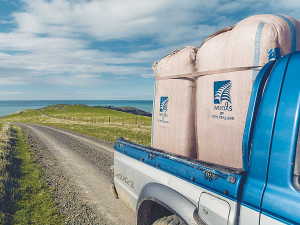Super-premium wool contract delivers major boost for New Zealand growers
Keratin biomaterials company Keraplast and Wools of New Zealand have signed a new superpremium wool contract which is said to deliver a boost to wool growers.
 Wools of New Zealand hopes the new deal will help fight counterfeiters and highlight the prestige of its product to Chinese consumers.
Wools of New Zealand hopes the new deal will help fight counterfeiters and highlight the prestige of its product to Chinese consumers.
Farmer-owned wool fibre and carpet producer Wools of New Zealand hopes that its new partnership with a major Chinese carpet and rug manufacturer will help combat counterfeiters in the global market and highlight the prestige of New Zealand wool to Chinese consumers.
Wool products falsely claiming to use NZ wool and carrying the Fern logo trademarked by the company have been found in the past around the world, including upholstery in Scandinavia and on carpets in the UK.
Wools of NZ chief executive John McWhirter told Rural News that they have found similar Fern symbols that resemble its own on wool carpets and have taken legal action to stop the misleading of consumers.
“This highlights the importance of an international team and partnerships. If we are not there, we cannot see it to stop it.”
Last month’s agreement allows Yangxin Ruixin to use Wools of New Zealand branding on its products as a mark of provenance and integrity. Founded in 1998 and located in the Shandong province, Yangxin Ruixin sells its products under the Silktouch brand in China, while exporting under the Ruixin brand. It produces a range of types of carpets and rugs for the commercial, hospitality and residential markets and operates the largest hand-tufted factory in China, with 3000 employees.
While Wools of New Zealand already has an extensive trade partner network internationally, this is the first arrangement the farmer-owned company has entered with a Chinese manufacturer to produce branded carpets.
“We already work with a New Zealand exporter to China and supply a yarn spinner who sells our farmers’ product into a range of companies in the Chinese market,” said McWhirter.
“However, this is our first agreement with a Chinese company producing branded products. Yangxin Ruixin will be able to use the Wools of New Zealand logo on their products that contain at least 60% Wools of New Zealand-supplied fibre.”
McWhirter says an advantage of the agreement is the ability of Yangxin Ruixin to monitor any Chinese manufacturers falsely claiming to be using Wools of New Zealand wool.
“Counterfeit wool claiming to be New Zealand wool does get sold. We have acted in the past against companies using our logo without permission.
“However, it is hard for us to police that in China, so it is very good to have a partner and ‘eyes in the market’ there. Working with Yangxin Ruixin means they have a brand-authenticated product and an interest in protecting the brand.”
McWhirter says they see ‘New Zealand Wool’ carpets across the world that on inspection contain fibres and contamination that does not originate in New Zealand.
“The temptation for spinners in China, India, and Europe to dilute New Zealand wool with cheaper fibre, to meet price points from retailers is immense.
“This is why ingredient branding is so critical to be able to ensure consumers are not sold counterfeit wool products. We talk about false claims globally; no different to what happened to the Kiwifruit industry, an issue solved with the Zespri brand. Without a protected brand on our wool, we have no way to stop false claims.
“The ‘Fernmark’ symbol is owned and protected by Wools of New Zealand for use on wool textiles around the globe. We have invested heavily in copyright over the last 40 years and still do today.”
When it comes to arranging the sound system at Northland Field Days, no one does it better than Colin Finlayson.
A 40th Anniversary event to remember.
The Mountain Warrior Shane Cameron is coming back to his roots as key note speaker at the East Coast Farming Expo Property Brokers Evening Muster in February.
OPINION: The euphoria over the Government’s two new bills to replace the broken Resource Management Act is over.
While the recent storms in the upper and eastern part of the North Island have hit a few kiwifruit growers, it is unlikely to have a major impact on the overall industry.
Keratin biomaterials company Keraplast and Wools of New Zealand have signed a new superpremium wool contract which is said to deliver a boost to wool growers.

OPINION: ECan data was released a few days ago showing Canterbury farmers have made “giant strides on environmental performance”.
OPINION: First on the scene after the recent devastating storms in parts of the North Island were emergency services and selfless…